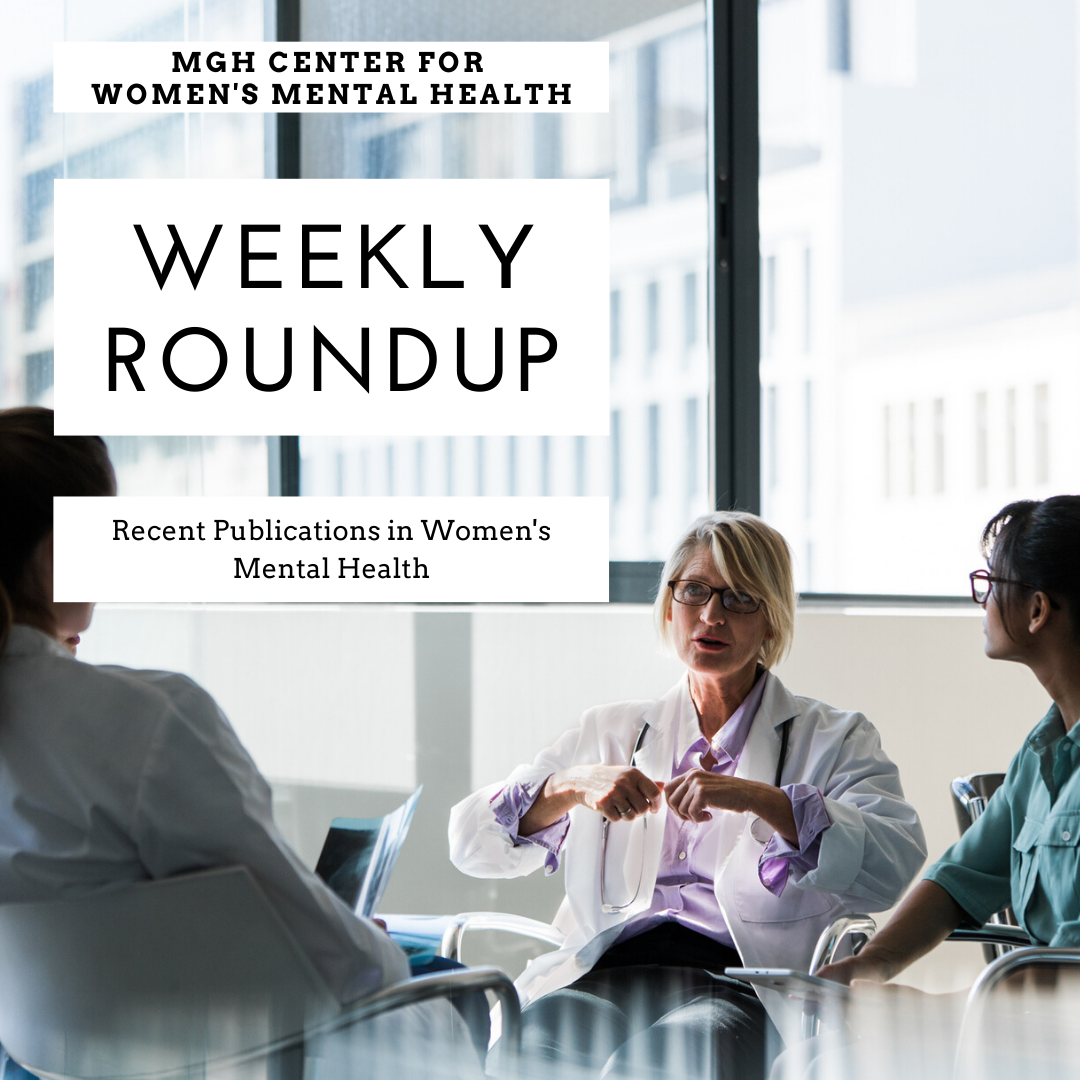Every week we review the most recent publications in women’s mental health, covering topics related to premenstrual symptoms, perinatal mood and anxiety disorders, use of medications in pregnant and breastfeeding women, perinatal substance use, and menopausal mental health.
Several articles focus on infertility and mental health. Somewhat counterintuitively, a review article finds that infertile couples who conceive through IVF have lower levels of depression and anxiety than couples who conceive naturally.
The COVID-19 pandemic disrupted infertility treatment for many couples. Two articles looked at the impact of infertility treatment suspension on the mental well-being of couples. High levels of depression and anxiety were reported.
For more detailed descriptions of many of these topics, you can sign up to receive our weekly CWMH NEWSLETTER which comes out every Thursday.
Ruta Nonacs, MD PhD
PMS AND PMDD |
| Suicidality in women with Premenstrual Dysphoric Disorder: a systematic literature review.
Osborn E, Brooks J, O’Brien PMS, Wittkowski A. Arch Womens Ment Health. 2020 Sep 16. Suicidal thoughts, ideation, plans and attempts were strongly associated with PMDD; these findings were independent of psychiatric co-morbidities.
|
INFERTILITY AND MENTAL HEALTH |
| The psychological impact of fertility treatment suspensions during the COVID-19 pandemic.
Gordon JL, Balsom AA. PLoS One. 2020 Sep 18;15(9):e0239253. Free article. In a group of women for whom infertility treatment was suspended, 52% endorsed clinical levels of depressive symptoms and a significant decline in overall quality of life. Influence of COVID-19 pandemic on the psychological status of infertile couples. Esposito V, Rania E, Lico D, Pedri S, Fiorenza A, Strati MF, Conforti A, Marrone V, Carosso A, Revelli A, Zullo F, Di Carlo C, Venturella R. Eur J Obstet Gynecol Reprod Biol. 2020 Oct;253:148-153. The COVID-19 pandemic itself and the recommendation to stop ART program generated higher distress levels in infertile couples. Is in vitro fertilization (IVF) associated with perinatal affective disorders? Capuzzi E, Caldiroli A, Ciscato V, Zanvit FG, Bollati V, Barkin JL, Clerici M, Buoli M. J Affect Disord. 2020 Aug 13;277:271-278. Women who resorted to IVF showed less anxiety and depressive symptoms than those who conceived naturally especially with the progression of pregnancy and in the postpartum.
|
PSYCHIATRIC ILLNESS DURING PREGNANCY |
| Screening for Mental Health and Substance Use Disorders in Obstetric Settings.
Byatt N, Masters GA, Bergman AL, Moore Simas TA. Curr Psychiatry Rep. 2020 Sep 16;22(11):62. Review. Molenaar NM, Brouwer ME, Burger H, Kamperman AM, Bergink V, Hoogendijk WJG, Williams AD, Bockting CLH, Lambregtse-van den Berg MP. J Clin Psychiatry. 2020 Jun 23;81(4):19l13099. Free article. In this small study including 44 women, there was no evidence that Preventive Cognitive Therapy with gradual discontinuation of antidepressants during pregnancy altered the risk of maternal relapse of depression as compared to continuation of antidepressants. Meltzer-Brody S, Kimmel M. Obstet Gynecol. 2020 Oct;136(4):643-644.
|
MEDICATIONS AND PREGNANCY |
| No articles this week
|
POSTPARTUM PSYCHIATRIC ILLNESS |
| General medical conditions and mortality in women with postpartum psychiatric disorders.
Johannsen BMW, Laursen TM, Bech BH, Munk-Olsen T. Acta Psychiatr Scand. 2020 Sep 11. Mortality from both natural and unnatural causes was higher in both groups: Mild-moderate PPD: natural causes MRR 1.37; 95% CI: 1.17-1.61; unnatural causes MRR 1.52; 95% CI: 1.10-2.11, and severe PPD: natural causes MRR 1.42; 95% CI 1.02-2.00, and unnatural causes MRR 5.05; 95% CI: 3.40-7.51. Primacy of (hypo) mania in the postpartum period: A concept worth considering. Sharma V, Viguera AC, Di Florio A, Mazmanian D, Koukopoulos A, Sani G, Palagini L, Özerdem A. Bipolar Disord. 2020 Sep;22(6):553-555. Editorial. Galbally M, Watson SJ, Keelan J, MacMillan KK, Power J, IJzendoorn MV, Lewis AJ. J Psychiatr Res. 2020 Jul 29;130:247-253. Lower gestational age, maternal depression and early childhood trauma, and late pregnancy oxytocin concentrations were associated with childhood emotional disorders at age 4. |
MEDICATIONS AND BREASTFEEDING |
| Associations between Sleep and Cognitive Performance in a Racially/Ethnically Diverse Cohort: The Study of Women’s Health Across the Nation (SWAN).
Swanson LM, Hood MM, Hall MH, Kravitz HM, Matthews KA, Joffe H, Thurston RC, Butters MA, Ruppert K, Harlow SD. Sleep. 2020 Sep 12. Greater wake time after sleep onset and fragmentation were concurrently associated with slower information processing speed. Black participants had significantly worse sleep relative to other race/ethnic groups. |
PERINATAL SUBSTANCE USE |
| No articles this week
|
MATERNAL MENTAL HEALTH AND CHILD OUTCOMES |
| Maternal antenatal stress and mental and behavioral disorders in their children.
Tuovinen S, Lahti-Pulkkinen M, Girchenko P, Heinonen K, Lahti J, Reynolds RM, Hämäläinen E, Villa PM, Kajantie E, Laivuori H, Raikkonen K. J Affect Disord. 2020 Sep 15;278:57-65. The hazard of any childhood mental and behavioral disorder (HR=1.91, 95% CI: 1.39-2.51) was significantly higher for children whose mothers reported consistently high levels of stress in comparison to consistently low levels of all types of stress throughout pregnancy. The associations remained significant when adjusted for maternal and paternal lifetime mood and anxiety disorder Maternal Psychological Resilience During Pregnancy and Newborn Telomere Length: A Prospective Study. Verner G, Epel E, Lahti-Pulkkinen M, Kajantie E, Buss C, Lin J, Blackburn E, Räikkönen K, Wadhwa PD, Entringer S. Am J Psychiatry. 2020 Sep 11 Maternal stress significantly predicted shorter newborn telomere length (TL, ?=-0.079), and positivity significantly predicted longer TL (?=0.135). Maternal resilience (positivity accounting for stress) was significantly and positively associated with newborn TL.
|
MENOPAUSE AND MENTAL HEALTH |
| No articles this week
|
OTHER TOPICS IN WOMEN’S MENTAL HEALTH |
| No articles this week |




Leave A Comment